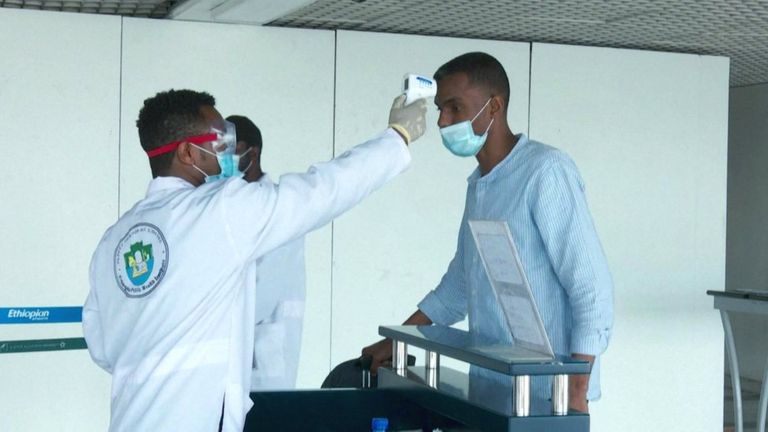Although the transmission rate for coronavirus in Africa has so far been much slower than in Europe, the economic effects are still being felt.
Measures put in place to limit the spread of the virus have disrupted economic activity in many nations.
Small businesses that import items from countries like China are already feeling the pinch.
And governments and investors fear there will be longer-term negative effects on economic growth.
It is not yet clear how hard the coronavirus will hit Africa’s economies. Before the onset of the pandemic, the African Development Bank had projected African economic growth to reach 3.9% in 2020, up from 3.4% in 2019.
But now experts say the pandemic could cut the continent’s growth by between 3-8 percentage points this year.
Many businesses have been forced to close as a result of the coronavirus lockdown, with curfews in place in some African nations and bans on both public and private transport in place.
Auka Gecheo is the owner of Live Eye TV, a broadcast agency based in Nairobi, Kenya which employs many freelancers.
Mr Gecheo’s studios are usually bustling with various TV productions, and the firm also offers outdoor broadcast and post-production editing services. The studios now stand silent.
“We’ve had some one-off events where we’d already been engaged, signed the contract, down payments given and some of the clients are demanding their down payments back,” he tells the BBC.
“We have about 30 people sitting at home right now doing nothing, so it’s really a big impact.”
But a precious few firms have been able to repurpose their production lines or cater to key workers, and are able to stay open.
Repurposing production lines
One thing that has risen is demand for hand sanitiser.
In Botswana, a perfumier is now making hand sanitiser, and in Uganda, manufacturers are operating at full capacity to make them, including the producers of alcoholic beverages.
Premier Distilleries, which was originally set up to produce wines and spirits, is now producing hand sanitisers, as requested by the Ugandan government.
“Our whisky lines are down, there aren’t much sales for that right now, so at least we make ourselves busy and keep some people working,” says Premier Distilleries boss Sitaram Reddy.
“We used to have 300 people working here, but we have now cut down to 20% of the [workforce].”
The problem is that many African nations have long gotten used to importing many goods from countries like China or India, or other African nations – particularly landlocked countries like Uganda.
“If there’s one thing this experience has taught us, it’s the need to develop local capacities, because one of the key challenges that has arisen as a result of the coronavirus is that global supply chains have been disrupted,” Daniel Birungi, executive director of the Uganda Manufacturing Association explains to the BBC.
The Uganda National Bureau of Standards (UNBS) has a role to play in the coronavirus crisis too – companies that want to repurpose their business to make new, much-needed products during the lockdown have to ensure that they meet certain standards before goods are allowed to be sold.
“We will look at the area of production, we assess whether the manufacturer has put in controls to ensure sustainable quality production. So do you have the competent personnel, have you calibrated equipment, do you source the right material, do you actually maintain good manufacturing practices or even hygiene,” says UNBS principal surveillance officer Linda Kobere.
Uganda’s government hopes that even after the coronavirus pandemic ends, the “Buy Uganda, Build Uganda” initiative, which promotes consumption, usage and appreciation of locally-produced goods and services, will continue to flourish.
Keeping their doors open
Currently, tourism accounts for 10% of global GDP, according to the World Economic Forum. It is expected that the sector will be hit hard by the coronavirus lockdown and travel restrictions introduced around the world.

Industry experts fear that international tourist arrivals could fall by 20-30% in 2020. This could lead to about 50 million tourism jobs at risk globally, according to the World Travel and Tourism Council (WTTC).
About 80% of tourism firms are small and medium-sized businesses. In Africa, the industry is still in an early stage of its development, but the continent is the world’s second fastest growing region for tourism behind Asia Pacific, according to WTTC.
Malawi, home to Africa’s third largest lake, was a rising tourism hotspot prior to the lockdown, and although its beaches are now empty, one hotel chain has decided to stay open.
“We’ve chosen to keep our doors open in all the nine properties we’re running in Malawi,” says Yusuf Olela, chief executive of Sunbird Tourism, which usually offers upmarket accommodation for tourists and business travellers, as well as catering for corporate and private functions.
“The reason we’ve done that is that as much as the business is very low, we’ve believe that there are still organisations involved in the coronavirus response and they will still need some essential services that we offer.”
However, occupancy is now down to less than 15% across Sunbird Tourism’s hotels and resorts.
Mr Olela is very worried. If the coronavirus lockdown could end by August, the hotel chain would still be able to meet its obligations and continue to pay salaries, but if it goes on for any longer than that, he is not sure what they will do.
“The future does not look very promising, and the only thing that we could do if you ask me, is to hope that the situation does not stay for long, but we are looking at massive retrenchment if this persists,” he says.
“But at the moment, our focus now is to protect jobs and ensure people still have something to wake up to.”
— CNN



